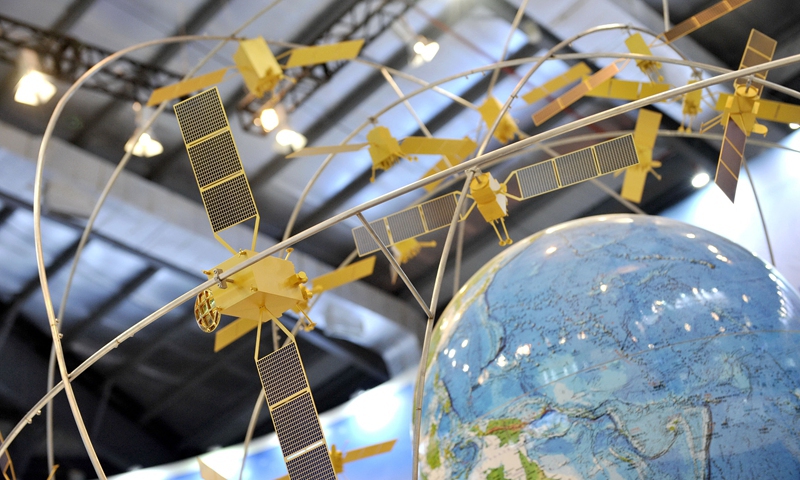
File photo of a model of the Beidou Satellite Navigation System. Photo:Xinhua
The overall output value of China's satellite navigation and positioning services industry reached 500.7 billion yuan ($71 billion) in 2022, with the scope of application of the homegrown BeiDou Navigation Satellite System (BDS) growing steadily, according to a white paper released on Thursday.
In the 2023 White Paper on the Development of China's Satellite Navigation and Positioning Services Industry, it revealed that the industry's overall output value last year saw a year-on-year increase of 6.76 percent.
Among them, the core output value of the industry - which includes chipsets, devices, algorithms, software, navigation data, terminal equipment, and infrastructure directly related to satellite navigation technology research and application - increased by 5.05 percent year-on-year, reaching 152.7 billion yuan, accounting for nearly one third of the total output value.
According to the GNSS and LBS Association of China, the total sales volume of domestic satellite navigation positioning terminal products in 2022 was about 376 million units.
This includes 264 million smartphones equipped with satellite navigation and positioning functions and over 12 million units of in-car navigation devices, as well as other types of positioning terminal devices, including wearable devices and high-precision equipment exceeding 100 million units.
The White Paper pointed out that in 2022, the scale of BDS applications continued to grow steadily, with further improvements in infrastructure, standardization, and other key areas. International cooperation on the BDS has also achieved steady development. The large-scale application of the homegrown navigation system is opening a new chapter in marketization, industrialization, and internationalization, said the paper.
In terms of professional applications, according to incomplete statistics, more than 20 million BDS terminals have been used in various fields as of 2022, including weather monitoring, emergency response, and urban management.
In the transportation sector, various types of BDS terminals have been applied in road transport vehicles, postal and express delivery vehicles, vessels, waterway navigation facilities, and general aviation, with a cumulative amount of over 8.1 million.
In the mobile communication sector, nearly 3.3 million 4G and 5G base stations have utilized BDS time synchronization. In the agricultural sector, BDS terminals have been used in areas such as agricultural machinery automation, remote monitoring of machinery, and fishing vessels, totaling nearly 1.6 million units.
Additionally, the high-precision market is rapidly developing, with the total sales volume of various high-precision application terminals (including measurement receivers) exceeding 2 million in the domestic market in 2022. Among them, more than 80 percent of the terminals utilize domestically produced high-precision chips or modules.
In the mass market, the BeiDou system has been further integrated into people's daily lives, creating more application scenarios and expanding the scale of its mass market applications.
Baidu Map and Amap, two of the most prominent navigation and positioning apps in China, have formally switched to prioritize BDS positioning, seeing a daily usage volume of over 360 billion times.
Meanwhile, BDS is also becoming a standard feature in smartphones.
In 2022, domestic smart phone shipments reached 264 million, of which 260 million supported BDS functionality, accounting for 98.5 percent. Currently, the majority of Chinese mobile apps that involve map services, navigation, and shopping have integrated BDS.
What's more, the world's first smartphone supporting BeiDou-3 regional short message communication services has been officially released, allowing users to send messages via BeiDou satellites without changing SIM cards, phone numbers or adding external devices.
On Wednesday, the
first backup BDS satellite was launched, following a three-year interval after the dense networking of the system's global constellation was completed. The launch will enhance the system's service performance, enabling users to achieve more rapid and precise positioning.
The satellite is of great significance for promoting the distinctive services of the BDS and supporting its large-scale application, as it will increase the communication capacity of regional short messaging and improve the performance of satellite-based augmentation and precise point positioning services.
Global Times




